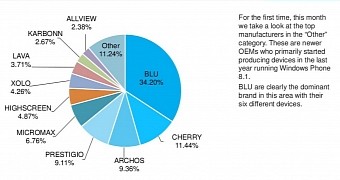It's clear that Microsoft dominates the Windows Phone market with its Lumia smartphones, and that will probably never change, but what about the other companies that make Windows Phone handsets?
Well, it looks like the latest AdDuplex statistics released on April 17 sheds some light, for the first time, on the hierarchy of the handset makers that release Windows Phone devices, other than Lumia.
According to AdDuplex, BLU, the US-based company well known for its affordable smartphone, dominates the top of Windows Phone manufacturers, other than Microsoft.
BLU own 34.20% of the Windows Phone market share, followed far behind by Cherry Mobile with 11.44% and Archos with 9.36%. The top continues with Prestigio (9.11%), Micromax (6.76%), Highscreen (4.87), XOLO (4.26%), Lava Mobiles (3.71%), Karbonn (2.67%) and Allview (2.38%).
The rest of 11.24% is owned by “other” brands that probably have lower than 1% market share, which is why they don't appear to be listed.
BLU might own around 1% of the total Windows Phone market share
It's surprising that Indian OEMs aren't among the top 3 Windows Phone smartphone makers since India was one of Microsoft's stronger markets in the past.
It's also worth mentioning that most of the companies listed on this top don't have more than two Windows Phone handsets launched on the market until now.
Although BLU tops the “other” category of Windows Phone handset manufacturers with 34%, there's no way that the US-based company will ever be able to even slightly compete with Microsoft.
Microsoft Lumia owns now less than 97% of the Windows Phone market share while Samsung, HTC, LG and Huawei might have a little bit under 3%.
This means that BLU may own a lot less than 1% from Windows Phone market share, but it the company continues to launch new smartphones and expand its market, that number might increase soon.
Hopefully, Microsoft's partners will launch more smartphones in the coming months because competition is always good for consumers.

 14 DAY TRIAL //
14 DAY TRIAL //